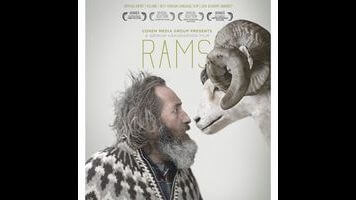Sports fans hoping for the thrilling saga of a football team’s journey from Cleveland to Los Angeles to Anaheim to St. Louis and then back to Los Angeles again will be disappointed to learn that Rams is quite literally about rams (and sheep). Lots of ’em. The title does also have a blatantly metaphorical aspect, however, as most of the film’s head-butting is performed by two craggy, middle-aged shepherds. That wry yet combustible comedy of orneriness, wedded to striking remote landscapes and forbidding weather, could make Rams the first Icelandic arthouse success in America since Cold Fever back in 1996—and that one featured the likes of Lili Taylor and Fisher Stevens, plus a Japanese lead actor. Rams, by contrast, is all Iceland all the time, and while it failed to snag a foreign-language Oscar nomination (after winning the top prize in the Un Certain Regard section at Cannes last year), it does its country proud.
At its core, the film is a war of attrition between Gummi (Sigor∂ur Sigurjónsson) and Kiddi (Theodór Júlíusson), 60-ish brothers who breed sheep on adjacent farms separated by only a few yards. For reasons that are (wisely) never quite specified, the two men haven’t spoken in about 40 years, despite their shared profession and physical proximity; on the rare occasions when they have need to communicate, a sheepdog delivering a terse note suffices. They also compete, with visible jealousy and rancor, in an annual contest to see which farmer in their rural valley has produced the most aesthetically impressive ram. Kiddi takes home the trophy on this particular occasion, but Gummi, secretly inspecting the winner, discovers that his brother’s flock is infected with scrapie, the ovine equivalent of mad cow disease. This leads to a decree from the authorities that all sheep in the region be killed, which one brother obeys (under duress) and the other mostly obeys, kicking their rivalry into truly high gear.
For much of its brisk running time, Rams wrings laughs from fairly broad sources; a lot of the humor is rooted in the sight of fat naked men, which reliably plays as absurdist incongruity on a movie screen. Gradually, though (and almost imperceptibly at first), the film deepens. Director Grímur Hákonarson knows his way around a visual punchline—there’s a fantastic gag involving a drunken bender and a tractor—but his background in documentary informs the way that he establishes a vivid sense of place, which in turn provides the story with a genuine feeling of history. Sigurjónsson and Júlíusson build on this in their distinct performances (one’s angry, the other more sorrowful), silently conveying the weight of whatever long-ago betrayal led to their estrangement. In its lovely final scene, Rams unexpectedly transforms from comedy to something far more poignant, and that shift reverberates backward through the entire movie, even recontextualizing all the nude-dude jokes. It’s a neat trick, and serves as a welcome reminder that Icelandic cinema (a) exists and (b) has a flavor of its own—part goofy, part tender.









































